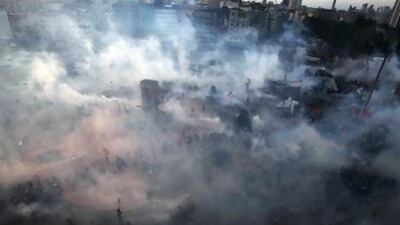TUNIS // As tear gas filled Istanbul's streets and anti-government demonstrators faced off with police this month, the man at the centre of it all, Recep Tayyip Erdogan, flew to the Maghreb for meetings and trade agreements in Morocco, Algeria and Tunis.
Through letters published on activist websites, Turkish protesters urged Tunisians, who overthrew the autocratic Zine El Abidine Ben Ali in an uprising more than two years ago, to demonstrate against the Turkish prime minister. As Mr Erdogan assured leaders in Morocco that everything was fine, Facebook groups in Tunisia planned to rally against his crackdown.
Mr Erdogan landed in Tunis to find a security lockdown around the places he was visiting and the Turkish embassy, and although small demonstrations took place, they seemed to lack the popular backing of Tunisians - who in 2011 voted in a government led by moderate Islamists strongly linked with Mr Erdogan's Justice and Development Party (AKP).
Although some Tunisian activist websites and secular-leaning newspapers were critical of the Turkish premier, analysts say that most ruling politicians and their supporters in the post-uprising North African states are likely to support Mr Erdogan over the protesters.
"There's an ideological kinship," said Shadi Hamid, of the Brookings Institute in Doha. "Even if we put explicit support aside for a moment, whenever you speak to Muslim Brotherhood or Ennahda or the Libyan [Brotherhood-linked] party, the Turkish model always comes up."
"What's happening in Turkey," he added, "is similar to what Mohammed Morsi and the Egyptian government have gone through: it's basically the same narrative of an Islamist majority versus a secular minority who feel they are being trampled.
While there has not been a unified cause rallying demonstrators in Istanbul - the protests started out about the environment, but have grown to include freedom of speech and perceived autocracy among other things - the demonstrators have been largely young and secular.
The Islamists in Egypt "probably see themselves in Erdogan", said Yasser El Shimy, an Egypt analyst with the International Crisis Group think tank. In Egypt, while the majority of the population voted either for the moderate Islamist party affiliated with the Muslim Brotherhood or the more radical Al Nour party, there have been intermittent demonstrations by more secular or liberal groups.
Egypt's Muslim Brotherhood, of which the president Mohammed Morsi was a long-time leader, are among the many groups who have long been influenced by Mr Erdogan's successful blend of Islam and democracy. His standing in the country has also been strong since he walked off the stage after a clash with Israeli president Shimon Peres at the Davos conference in 2009.
"The Islamists in Egypt would look up to him for his leadership, and right now they would think that it was a good example of how to deal with this kind of protest where a secular minority has somehow tried to force their views on the majority," said Mr El Shimy.
During the decades when anti-Islamist leaders held sway in Egypt, Libya and Tunisia, and Islamist movements were pushed underground, help from the AKP was often their life blood, offering training.
"There's been a great deal of traffic between" Ennahda in Tunis and Mr Erdogan's AKP, said Henri Barkey, a professor of international relations at Lehigh University in Pennsylvania, USA. "In Tunis there's always been a great deal of admiration for Turkey."
Turkey's position in the region is bolstered by its economic power, he added. "They have fixed their economic situation, that gives them the ability to export, the ability to penetrate markets everywhere." Mr Erdogan's Tunis visit was marked by a trade agreement and a speech targeting annual trade of $3bn (Dh11.01bn).
The economic power, said Mr Barkey, comes with a political goal. "They want to be seen as the country that keeps order in the region, which effectively means they want hegemonic power in the region ... the Turks are in many ways the small America in the region."
Radwan Masmoudi, head of the Centre for the Study of Islam and Democracy in Tunis, who is close to the moderate ruling party Ennahda, said the country's politicians see Mr Erdogan as a success story who has managed to combine Islam and democracy. Sympathy for the protesters is limited.
"The way people are looking at it, democracy is nice and freedom is nice, but they don't want anarchy. There are violent demonstrations every day." The crucial difference between Istanbul's demonstrations and the ones that eventually ushered Ennahda into power, he said, is that in Turkey the people have the democratic option to vote against their leaders.
"You can't occupy a public square and do revolution against an elected government," Mr Masmoudi said. "When a government is not elected and is representative, then all means become legitimate.
"That is certainly not the case in Turkey."
afordham@thenational.ae
twitter: For breaking news from the Gulf, the Middle East and around the globe follow The National World. Follow us

